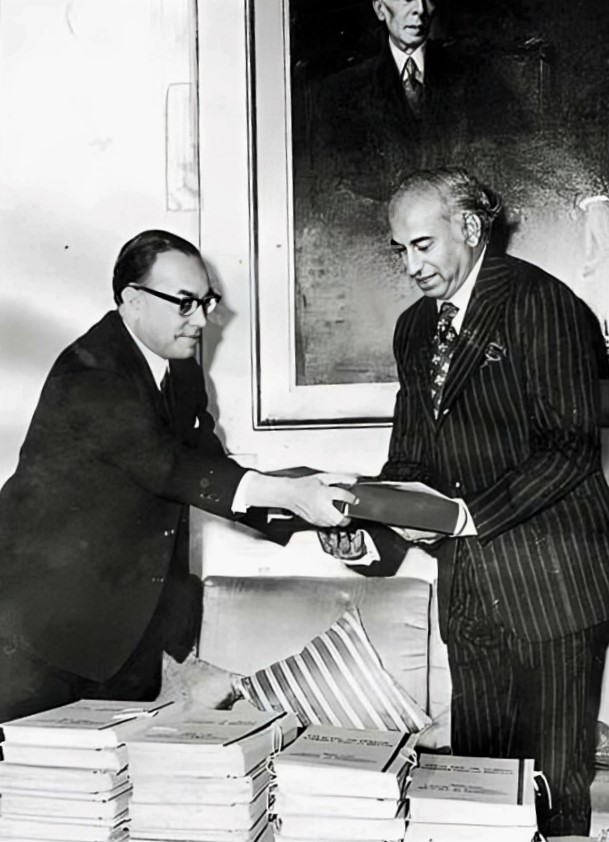Newspaper Article 06/07/2022
Naseer Turabi, a legendary Urdu poet, could not have prophesied it better. He was in tears on hearing the news of the Fall of Dhaka in December 1971, and he penned his emotions instantly by saying:
Vo ham-safar thā magar us se ham-navā. ī na thī, Ke dhuup chhāñv kā aalam rahā judā.ī na thī;
Mohabbatoñ kā safar is tarah bhī guzrā thā, Shikasta-dil the musāfir shikasta-pā.ī na thī;
Adāvateñ theeñ, taġhāful thaa, ranjisheñ theeñ bahut, bichhadne vaale meñ sab kuchh thaa, bevafā.ī na thī…
To precisely translate the last line of stanza, “…the one who departed may have had many faults, but he wasn’t disloyal…”
This poem stands as a landmark in prose and literature too, and intuitively defines the erstwhile spirit of bonding, love, hate, remorse and regrets among the then flanks of East and West Pakistan. Today a cursory look at how Bangladesh is a success story and how Pakistan is struggling to redefine its nationhood and existence brings to fore, at least, two aspects in mind: one; homogeneity overwhelms differences and there is much to learn and interact even today.
Fifty years down the lane since the velvet divorce, Bangladesh and Pakistan have come full circle. They have triumphed over their nationalism and lived fast against all odds. While Islamabad remained preoccupied with security concerns – owing to Cold War considerations, it could not focus enough on nation-building. Tensions on the eastern and western fronts with India and Afghanistan, respectively, were gangrenes on its body politic. It was also a victim of political instability and lack of appropriate quorum to groom its institutions.
This has been Pakistan’s biggest tragedy and one that never enabled it to scale new heights in egalitarianism and further the sense of oneness. But the fact that it has survived and is an enterprising nation with nuclear assets is a credit to its resilience. Whereas, Bangladesh swiftly overcame odds to strides new paths of success.
Bangladesh, nonetheless, had its own trajectory of upheavals. Civil and quasi-military rules, poverty and inclement weather ordeals had tested it to the core. But what made Bangladesh a success story in the South-East of Asia is its recourse to nationalism, linguistic uniqueness, a firm commitment to invest in education and human resource, and to dump the menace of feudalism by erecting an edifice of genuine electorates.
Let’s take a look at the checkered past as both the countries take strides to resetting their ties. Keeping aside the bad blood that had been there in terms of lack of compatibility in the national chorus when East Pakistan was part of united Pakistan; it is the 1971 revulsion that cemented the breach on perpetual lines. Since then-on, the relations have remained cold and static. The dismemberment saw death and destruction, and the most regrettable and remorseful episode of rape and plunder. That remains to be apologized to this day – and is a must to bury the hatchet in all decency as per norms of civilization.
Fast forward; it is pointless to keep ourselves bogged down in blame games, and try to find scapegoats at home and abroad who played havoc with our erstwhile fabric of coexistence. But it goes without saying that over the last five decades, no lawfare effort had been made to heal the wounds and mend fences. The Bengali dispensation has every reason to be annoyed at Pakistan, but the good aspect is that they know the culprits for sure, and have always kept a vista of cordiality open with the Pakistanis at large!

Relations would have been at a better pace had the so-called Hamood-ur-Rehman Commission come up with its categorical honest assessment in due course of time, and a process of reconciliation had started among the bruised sections of both the societies. HRC’s declassification after 30 years and that too with chopped and censured stanzas not only raised eyebrows but also made it a laughable affair. It also came as a psychological and strategic blow to the truncated Pakistan, which could never make its position clear to this day – and the clouds of distrust hang on. The role of India in fanning the divide, identifying war criminals, and the political vendetta behind separation is yet to be told.
It is, nonetheless, time to confront the dark past. A leap forward was made as former Prime Minister Imran Khan reached out to his counterpart, Sheikh Hasina, with an olive branch in March 2021. Dhaka reciprocated – and it was a great beginning to start with! Both the countries committed to peaceful and cooperative relations, and vowed to further trade and commerce. The spirit of regionalism was also reiterated, and it was a shot in the arm in not only making the eight-member SAARC a success, but also in engaging India as both the countries remain at bay with a 1,000-km hostile territory between them.
One of the prime reasons behind Islamabad walking the extra few miles towards Dhaka is rooted in the success story of Bangladesh. Gone are the days when the eastern Bengali flank was treated as a backwater, and an economy that was not performing. The days of destituteness are behind them, and Bangladesh is an emerging Asian Tiger – and one of the best-performing economies in the region. The once misnomer of Taka, Bengali currency, is now a strength and the Pakistani rupee is nosedived and in doldrums. Dhaka today has $44 billion as reserves as compared to the shrinking Islamabad forex of less than $9 billion — and that too caged at the hands of a merciless IMF program.
As of today, Pakistan has a trade surplus of 46.65% compared to the corresponding period of last year with Bangladesh. There is much that can be done to buoy commerce with Dhaka, especially in an era when Pakistan has pivoted towards geo-economics. Bangladesh can benefit from Pakistan’s seaports — Karachi and Gwadar – as CPEC takes roots. Likewise, it is high time Pakistan taps the potential of markets in Nepal and Bhutan, and shuttles its produce to Southeast Asia.
Bangladesh is certainly a gateway and the corridors of air and land are in need of being rejuvenated. Last but not least, apart from other potential trade lists, Pakistan being a cotton and textiles producing nation can strike wonders by cultivating Bangladeshi expertise. From jute to linen, both the nations have come a long way. There are wider possibilities in the defence sector too, as during 1980’s Pakistan exported F6 aircraft and tanks to Bangladesh, too. Those premises of interaction can be reworked.

On the nation-building format, it solicits some introspection as to why we slid down so badly, and how our estranged eastern partner did it so well? What went wrong and how? Henry Kissinger, the former US Secretary of State, had dubbed Bangladesh as a basket case (means redundant). Though many of his scholarly assessments proved to be true on the global horizon, he had to bite dust in the case of Bangladesh. The poverty-stricken South Asian nation with a dense population, prone to natural disasters, surprised all and sundry and triumphed for good.
Dhaka’s phenomenal progress in socio-economic avenues, coupled with a successful family planning program, empowerment of its women folk and last but not least its unique strata-driven micro-financing strategy took it to new heights of success. It became a leading export market on the virtues of its enterprising labour and raw material. Likewise, the political intuition and sagacity to evolve a truly decentralized power dissemination structure was the strength behind its unison, and that was aptly supplemented by homogeneity of language and culture. This is why after somersaults on the political landscape, Bangladesh has succeeded in knitting its rule of law and is a vibrant democracy at work. People’s level of consciousness towards their rights and belief in transparency and accountability is its victory.
While rubbing shoulders with our Bengali brethren anew, Pakistan has some lessons to learn in all humility. One: concentrate on indigenous potential, especially natural resources and industrious manpower. Two: empower the women and liberalize them in all walks of economy. Three: subdue religious segments and bring them under the scanner of the electorate. Four: decentralize the power paradigm and make it representative to the core – free from bureaucratic and military meddling. Five and foremost: instantly abolish feudalism and rewrite a new social contract.
Bangladesh had pursued a resilient path on all the above five parameters of national governance, as we remained engaged in a diatribe on civil-military relations and that too at the cost of liquidating our economy and politicizing our national institutions. There shouldn’t be any shyness in learning from Bangladesh’s versatile national discourse as they stand tall and orderly. Pakistan has immense potential in its bulging youth and is supersonic rich in natural resources in a four-season climatic country. What is needed is the true intention to introspect and walk the talk. Bangladesh is a role model in all humility.
To quote Naseer Turabi again, ajiib hotī hai rāh-e-suḳhan bhī dekh ‘naseer’ vahāñ bhī aa ga.e āḳhir, jahāñ rasā.ī na thī (it’s so mysterious often to find a path; destiny has led us to a place that wasn’t destined).
Note: This article appeared in Defence Journal, dated 06 July 2022.
Disclaimer: The views expressed in the article are of the author and do not necessarily represent Institute’s policy.

